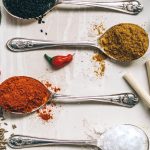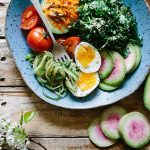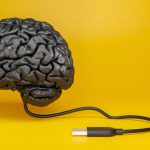If food plays such a vital role in your individual health, it only makes sense that it becomes doubly important when you’re supporting another life. Here is the science behind what to eat to ensure health and vitality for you and your baby.
What to Eat During Pregnancy
You’ve probably heard the old adage that you should eat for two for a healthy pregnancy. However, this doesn’t actually mean you have to eat twice as much as you’re used to. Instead, it’s more about the quality and diversity of nutrients you’re ingesting, and these can help with all kinds of issues including your morning sickness! In fact, during the first three months of pregnancy your calorie intake can stay the same as before pregnancy.
During the second trimester it’s recommended that you add 200 calories to your diet and up to 300 during your third trimester. A 200 calorie snack or meal could look like a bowl of cereal or a glass of milk, but what’s most important is that your extra snack or meal is packed with nutrients, or what is known in nutrition, that is a ‘nutrient dense’ food.
Candies and biscuits usually have a very low nutrient density, which means that the vitamins and minerals they have are practically nothing. Fruits and veggies on the other hand have a very high nutrient density, so that you get much more for every calorie.
See Also: The Important Difference Between Yoga and Antenatal Yoga
Essential Nutrients for a Healthy Pregnancy
1. Vitamin B9: for a healthy brain and spinal cord
Vitamin B9, better known as folic acid in its synthetic form, is important during pregnancy to prevent birth defects — particularly those related to the spinal cord and the brain. Folic acid supplementation has been shown to decrease the risk of preterm delivery.
A daily dose of 800 micrograms (mcg) of folic acid is recommended about a year before you plan to get pregnant and during your pregnancy. Most multivitamins have at least 400 mcg of folic acid. You can obtain your daily recommended source of vitamin B9 from fortified cereals, leafy greens, citrus fruits, and pulses. Supplements could also be helpful to make sure that you obtain your daily requirement.
One cup of spinach can provide you with 263 mcg of vitamin B9, 1 cup of kidney beans with 92 mcg, and 1 cup of broccoli or mustard greens up to 104 mcg. Fruits can also aid you in obtaining your daily required dose: a grapefruit can give you 30 mcg whilst a whole papaya can provide you with 115 mcg. All of these foods can be distributed throughout the day and added as part of your meals and snacks.
2. Calcium: for strong teeth, bones and more
Calcium is essential for your and your baby’s circulatory, nervous and muscular systems. If you are in your teens 1,300 mg/day is recommended, otherwise 1,000 g/day are advised.
Animal sources have a higher calcium absorbance rate than vegetable sources. Some calcium-rich food options include broccoli (47mg/1 cup), non-fat mozzarella (961mg/100g), almonds (264 mg), sardines (383mg/100g) and fortified cereals or fortified dairy substitutes such as rice milk.
3. Vitamin D: to promote bone strength
Without vitamin D, calcium cannot be absorbed. Obtain it directly from sunshine or from sardines, salmon, fortified milk and drinks. All you need is 600 international units (IU) a day — about 20 or 25 minutes in the sun or a serving of fish like salmon or tuna — which also happens to be good for your skin!
4. Iron: for a healthy blood supply
Iron is essential for your body to produce haemoglobin and help carry oxygen around. During pregnancy not only will the iron in your diet influence the blood supply of your newborn to come, but it’s also required due to the blood volume expansion that occurs in pregnancy. Having a good supply of iron in your body will help you have a strong immune system and prevent infections, extreme tiredness and even preterm delivery and low birth weight.
Doctors recommend 27 mg of iron a day for pregnant women. This can be obtained from pulses, meat, poultry, fish, fortified cereals and vegetables. Beans can contain from 2.6 – 4.9 grams of iron for every ¾ of a cup. Beef contains around 1.4 – 3.3 g from 1 portion (the palm of your hand), and oatmeal contains about 4.5 -6.6 g of iron.
Remember to take your iron-rich food along with vitamin C to increase the iron’s absorption. Also avoid ingesting a lot of fibre or tea while taking iron-rich foods or supplements since those slow the body’s absorption of iron.
See Also: How to Eat the Rainbow in 5 Bites
5. Protein: growth and development
The first three months are crucial for your baby’s proper development. This doesn’t you have to go overboard with the protein, or even stop being a vegetarian if that’s the case. Extremes could be quite harmful. During pregnancy about 70g of protein are necessary.
To get an idea of what this is a cup of beans contains around 22g of protein, a portion of salmon or fish (3oz or about the size of a man’s wallet) has 22g of protein, a 3oz portion of of skinless chicken contains 28g of protein and one large egg has around 6g of protein.
You can try different sources of protein such as pulses, nuts, seeds, eggs, dairy products and substitutes and of course fish and meat is also an option. Fish can be beneficial and only some species (discussed below) should be avoided.
Where to Be Cautious
There are some foods that are recommended to limit or to avoid completely. Generally anything that has not been properly cooked or pasteurized should be avoided. These foods are carry a higher risk of carrying harmful bacteria. Such foods include raw or partly cooked eggs, pâté, cheeses with a white rind, soft blue cheese, liver, cold cured meats, raw shellfish, smoked fish, sushi (unless it has been previously frozen), shark, swordfish and marlin.
Its also important to take care when choosing supplements. Before taking any supplement or herbal remedy always consult your health provider. Even if they’re natural, there are some herbs and nutrients that could be harmful to your baby, especially if taken in excess. For example, vitamin A should be avoided as a supplement during pregnancy due to its abortive effect. Instead, fruits, veggies and animal sources could provide you with the required pro-vitamin A nutrients that your body and your baby need.
See Also: What It Actually Means to Eat Healthy in Four Simple Sayings
What About Morning Sickness?
Small sips of water or tea, ginger, a reduced level of stress, foods rich in B6 and magnesium such as avocado, bananas and chicken, lemon have all one thing in common: they can help you deal with the awful morning sickness. A helpful snack could also be crackers or a veggie mix with celery, cucumber and lime. At the end the key is to observe your body and avoid any foods that cause you discomfort.
In sum, a healthy pregnancy has a balance of foods that bring out the colour in your food and meals distributed throughout the day. Remember to have breakfast to avoid craving unhealthy snacks later in the day, since these can compete with or replace beneficial nutrients. Every different nutrient you eat will be contributing to a healthier growth and development of your baby.













